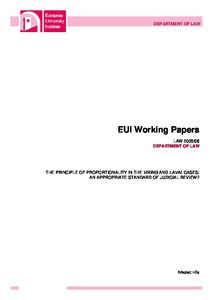The principle of proportionality in the Viking and Laval cases: an appropriate standard of judicial review?
"The article analyses the application of the proportionality principle in the Viking and Laval judgments. It argues that one of the main reasons why the outcome of these two eminent cases became so controversial was because of the way in which the Court applied the proportionality principle. Th...
| Main Author: | |
|---|---|
| Institution: | ETUI-European Trade Union Institute |
| Format: | TEXT |
| Language: | English |
| Published: |
San Domenico di Fiesole
2009
EUI |
| Subjects: | |
| Online Access: | https://www.labourline.org/KENTIKA-19188089124919062619-The-principle-of-proportionali.htm |
| Summary: | "The article analyses the application of the proportionality principle in the Viking and Laval judgments. It argues that one of the main reasons why the outcome of these two eminent cases became so controversial was because of the way in which the Court applied the proportionality principle. The paper will first give an overview about the application and elements of the proportionality test in EC internal market law; it will then raise two related issues, namely to what extent the so-called ‘Prinzip der praktischen Konkordanz’ is relevant in the existing case law and whether there is a need for a differentiated approach under the proportionality test in horizontal situations. The article urges the ECJ to develop a different standard of judicial review for trade union action. The paper will draw on some selective national examples to show that where a proportionality principle is applied in industrial action cases, both the elements and the substance of the test are different from those applied by the Court of Justice in these two cases. The last part of the paper will highlight the differences between the proportionality review in the two cases, including the importance of the reference to the minimum harmonisation clause of the Posted Workers Directive in the Laval judgement. Finally, the article invites the reader to pay attention to the broader constitutional implications of judgement in the field of social policy, i.e. to what extent the cases generated coordination between the Member States at the intergovernmental level." |
|---|---|
| Physical Description: | 37 p. Digital |

